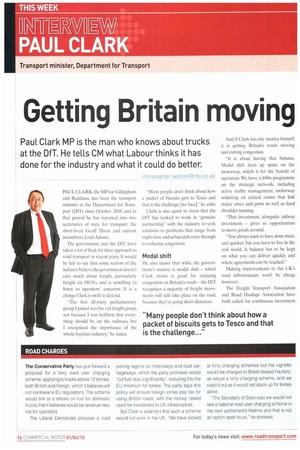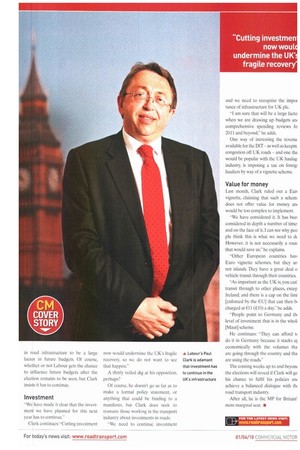ROAD CHARGES
Page 16

Page 17

If you've noticed an error in this article please click here to report it so we can fix it.
The Conservative Party rias put forward a proposal for a lorry road user charging scheme, applying to trucks above 12 tonnes, both British and foreign, which it believes will not contravene EU regulations. The scheme would link to a rebate on fuel for domestic trucks that it believes would be revenue neutral for operators.
The Liberal Democrats propose a road pricing regime on motorways and dual carriageways, which the party promises would "cut fuel duty significantly", reducing it to the EU minimum for lorries. The party says this policy will ensure foreign lorries pay tax for using British roads, with the money raised used for investment in UK infrastructure.
But Clark is adamant that such a scheme would not work in the UK, We have looked at lorry charging schemes but the vignette would be charged to British-based hauliers, as would a lorry charging scheme, and we ruled it out as it would not stack up for lorries alone, "The Secretary of State said we would not see a national road user charging scheme in the next parliament's lifetime and that is not an option open to us," he stresses. in road infrastructure to be a large factor in future budgets. Of course, whether or not Labour gets the chance to influence future budgets after the election remains to he seen. but Clark insists it has to continue.
Investment -Vve have made it clear that the investment we have planned for this next year has to continue."
Clark continues:"Cutting investment now would undermine the UK's fragile recovery, so we do not want to see that h appen, A thinly veiled dig at his opposition. perhaps?
Of course, he doesn't go as far as to make a formal policy statement, or anything that could be binding to a manifesto, but Clark does seek to reassure those working in the transport industry about investments in roads.
"We need to continue investment and we need to recognise the impot tance of infrastructure for UK plc.
"1 am sure that will be a large facto when we are drawing up budgets an comprehensive spending reviews fo 2011 and beyond," he adds.
One way of increasing the revenu available for the DfTas well as keepin congestion off UK roads and one tha would be popular with the UK haulag industry, is imposing a tax on foreig hauliers by way of a vignette scheme.
Value for money Last month, Clark ruled out a Eurl vignette, claiming that such a schem does not offer value for money an would he too complex to implement.
-We have considered it. It has beei considered in depth a number of time and on the face of it, I can see why pee pie think this is what we need to ck However, it is not necessarily a rout' that would save us." he explains.
"Other European countries hay' Euro vignette schemes, but they art not islands. They have a great deal o vehicle transit through their countries.
"As important as the UK is, you can' transit through to other places, excep Ireland, and there is a cap on the limi [enforced by the EU] that can then b■ charged at €11 (£10) a day,he adds.
"People point to Germany and thi level of investment that is in the wholl [Maut] scheme.
He continues: "They can afford ti do it in Germany because it stacks ul economically with the volumes tha are going through the country and tha are using the roads."
The coming weeks up to and beyom the elections will reveal if Clark will ge his chance to fulfil his policies an achieve a balanced dialogue with thl road transport industry.
After all, he is the MP for Britain' most marginal seat. •






























































































































































































